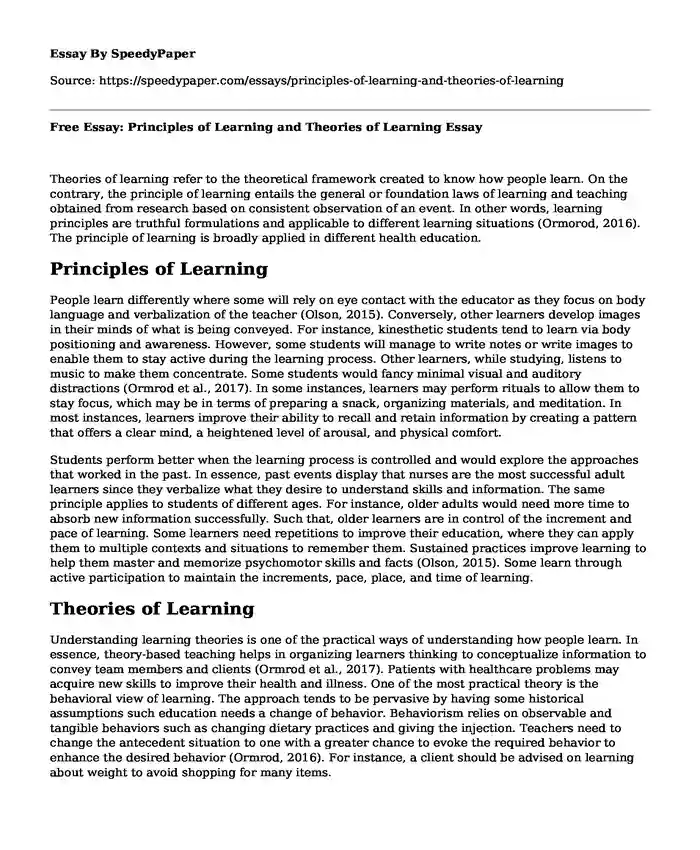
| Essay type: | Reflective essays |
| Categories: | Teaching Learning Knowledge |
| Pages: | 3 |
| Wordcount: | 587 words |
Theories of learning refer to the theoretical framework created to know how people learn. On the contrary, the principle of learning entails the general or foundation laws of learning and teaching obtained from research based on consistent observation of an event. In other words, learning principles are truthful formulations and applicable to different learning situations (Ormorod, 2016). The principle of learning is broadly applied in different health education.
Principles of Learning
People learn differently where some will rely on eye contact with the educator as they focus on body language and verbalization of the teacher (Olson, 2015). Conversely, other learners develop images in their minds of what is being conveyed. For instance, kinesthetic students tend to learn via body positioning and awareness. However, some students will manage to write notes or write images to enable them to stay active during the learning process. Other learners, while studying, listens to music to make them concentrate. Some students would fancy minimal visual and auditory distractions (Ormrod et al., 2017). In some instances, learners may perform rituals to allow them to stay focus, which may be in terms of preparing a snack, organizing materials, and meditation. In most instances, learners improve their ability to recall and retain information by creating a pattern that offers a clear mind, a heightened level of arousal, and physical comfort.
Students perform better when the learning process is controlled and would explore the approaches that worked in the past. In essence, past events display that nurses are the most successful adult learners since they verbalize what they desire to understand skills and information. The same principle applies to students of different ages. For instance, older adults would need more time to absorb new information successfully. Such that, older learners are in control of the increment and pace of learning. Some learners need repetitions to improve their education, where they can apply them to multiple contexts and situations to remember them. Sustained practices improve learning to help them master and memorize psychomotor skills and facts (Olson, 2015). Some learn through active participation to maintain the increments, pace, place, and time of learning.
Theories of Learning
Understanding learning theories is one of the practical ways of understanding how people learn. In essence, theory-based teaching helps in organizing learners thinking to conceptualize information to convey team members and clients (Ormrod et al., 2017). Patients with healthcare problems may acquire new skills to improve their health and illness. One of the most practical theory is the behavioral view of learning. The approach tends to be pervasive by having some historical assumptions such education needs a change of behavior. Behaviorism relies on observable and tangible behaviors such as changing dietary practices and giving the injection. Teachers need to change the antecedent situation to one with a greater chance to evoke the required behavior to enhance the desired behavior (Ormrod, 2016). For instance, a client should be advised on learning about weight to avoid shopping for many items.
Cognitivism is based on individual thought processes such as how individuals remember information, understand, interpret, and perceive information about environmental situations. Unlike behaviorism, which is based on observable behavioral changes, cognitive view of learning tends to enhance learning to capture internal mental processes of every individual, such as meaning, insight, and perception (Olson, 2015). In this context, knowledge is connected and organized to individual emotions, attitudes, beliefs, and knowledge.
References
Olson, M. H. (2015). Introduction to theories of learning (9th ed.). Psychology Press.
Ormrod, J. E. (2016). Human learning. Pearson Higher Ed.
Ormrod, J. E., Anderman, E. M., & Anderman, L. H. (2017). Educational psychology: Developing learners. Pearson.
Cite this page
Free Essay: Principles of Learning and Theories of Learning. (2023, Aug 31). Retrieved from https://speedypaper.net/essays/principles-of-learning-and-theories-of-learning
Request Removal
If you are the original author of this essay and no longer wish to have it published on the SpeedyPaper website, please click below to request its removal:
- UCAS Personal Statement Example for Business Management
- Essay Sample on Knowledge Management and Consumer Relation Management
- Free Example on Personal Frame of Reference
- How English Can Influence a Student's Future Career - Essay Sample
- Free Essay. Contingencies of Punishment That May Interfere With the Acquisition of New Skills
- Paper Example: Maryland Counseling Association Emerging Leaders Program
- Free Essay. Decision-Making Oriented Approach
Popular categories




